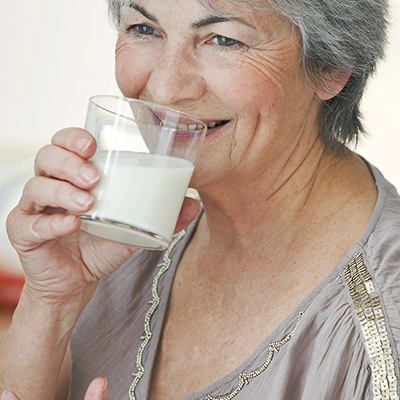Research dispels the myth that protein is bad for bones
The theory that higher protein diets are bad for bones is a persistent myth, even though it is not supported by scientific consensus.
The theory suggests that eating higher amounts of protein, especially from meat and dairy foods, increases acidity of blood, leaching calcium and other minerals from bones, which is then excreted in urine. A 2013 review by respected bone expert Jean-Philippe Bonjour explains that maintaining acid-base and calcium balance in the body of healthy people is the role of the kidney, not bone. Over the last decade, accumulating research has shown that consuming a higher protein diet is not detrimental to markers of bone health.
For example, a new systematic review and meta-analysis from the National Osteoporosis Foundation concludes that higher protein intake shows no harmful effects on bone. Researchers reviewed data and findings from 16 randomized controlled trials (the gold standard for research) and 20 prospective cohort studies on the effects of “high versus low” protein intake and protein along with calcium and/or vitamin D on bone health outcomes.
Here’s what they found:
- Nearly all bone sites (spine, total hip, femoral neck, total body) showed a trend towards higher bone mineral density and/or bone mineral content with higher protein intakes compared to lower protein intakes, though many findings were not consistent across studies.
- It was difficult to assess the effect of high vs. low protein consumption on risk of fracture because most studies assessed lasted no longer than 2 years. This is an important focus for future long-term studies.
- Moderate evidence showed that higher vs. lower protein consumption may cause less bone mineral density loss in older adults.
The studies evaluated varied widely in design, the amount of protein considered “high” and “low,” the length and the outcomes reported. This hampered the ability to reach firm conclusions. Nevertheless, the researchers concluded, “Overall, the body of evidence shows that the effect of dietary protein on the skeleton appears to be favorable to a small extent and not detrimental.”
Additional research also indicates protein’ may benefit bone health outcomes. In early 2017, a large cross-sectional study in 746 healthy postmenopausal women in Switzerland predicted that higher protein consumption, particularly from animal and dairy sources, was associated with greater bone strength and microstructure. This was the first study to show a relationship between eating protein and estimated bone strength measured with modeling. The major effect of protein was on trabecular bone structure, the honeycomb-like structure inside the bone. The women had average dietary protein consumption (0.8 to 1.2 g/kg of body weight) within or slightly above the recommended amounts for their age. The recommended dietary allowance for protein is 0.8 g/kg of body weight. About two-thirds of the protein they ate came from animal foods, and dairy products represented over one-quarter of their total protein intake.
Higher-protein diets within the range of recommended intakes have become increasingly popular to help preserve muscle in aging people and helping with appetite control. Now, evidence shows that high-quality protein, such as that found in milk, yogurt and cheese, can help support bone health as well, when adequate calcium is consumed.















